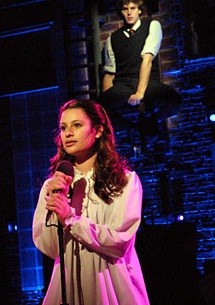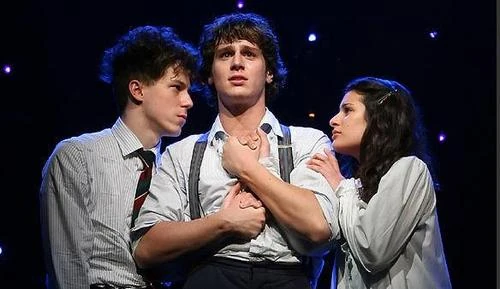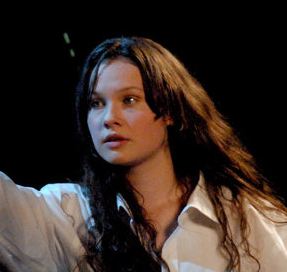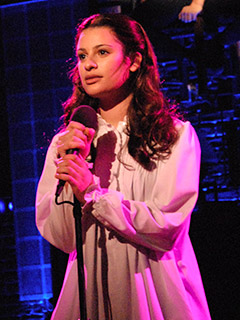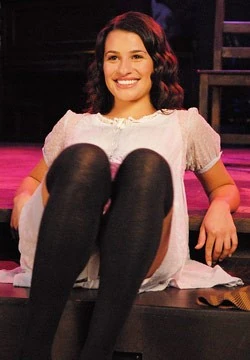No edit summary Tags: Visual edit apiedit |
mNo edit summary Tags: Visual edit apiedit |
||
| Line 1: | Line 1: | ||
| − | Wendla is the female lead of |
+ | Wendla Bergman is the female lead of the Spring Awakening play and musical, and the tritagonist overall. She dies in both from a botched abortion. Lea Michele played Wendla in the Original Broadway Cast. {{Infobox |
| − | |||
| − | Lea Michele played Wendla in the Original Broadway Cast.{{Infobox |
||
|Box title = Wendla Bergmann|Image file = Wendla.png|Image size = 250px|Row 1 title = Born|Row 1 info = May 5, 1878 |
|Box title = Wendla Bergmann|Image file = Wendla.png|Image size = 250px|Row 1 title = Born|Row 1 info = May 5, 1878 |
||
Revision as of 09:42, 22 November 2016
Wendla Bergman is the female lead of the Spring Awakening play and musical, and the tritagonist overall. She dies in both from a botched abortion. Lea Michele played Wendla in the Original Broadway Cast.
Background
Wendla Bergmann (May 5, 1878 - October 27, 1892) is a 14 year old girl, who lives in Germany in the 1890's. Wendla is naive about adult relationships but very charitable and nice. Wendla is close friends with Martha Bessell, Anna and Thea. She has an older sister (Ina Muller) who is married with two children, she is the daughter of Frau Bergmann, and childhood friends with Moritz Stiefel, Melchior Gabor and Ilse Neumann. Wendla is the female lead of the play and the musical, and dies in both. Lea Michele played Wendla in the Original Broadway Cast.
In Spring Awakening, it starts with Wendla turning fourteen. She begins to to question the essence of childhood, to her mother.
Plot
Act 1
The play opens with Wendla, who has just turned fourteen. Desperate to understand sex she asks her mother multiple times before her mother turns her away, telling her to ask her when she's older
Next we see Wendla with her friends discussing Martha's home life, she tries to comfort Martha, but does not truly understand her pain. To help herself understand she asks Melchior (who finds her daydreaming as he is walking through the forest) to beat her with a stick. First he is reluctant but soon shows no remorse and starts hurting her, before running off.
Wendla is unaware of how sex works, but does no longer believe in the stork, as her mother wants her to. This is shown straight away in the musical, however takes a little longer for the play to express this.
Hayloft Scene
In the musical Melchior advances on Wendla in the hayloft under the false pretense that Wendla is in love with him and wants to have sex, however Wendla had shown nearly no signs of having any feelings for Melchior beyond platonic ones, and panics, as she does not understand what is happening. She eventually relents, but still does not want to engage in the sexual activity; despite Melchior forcing himself on her.
In the play, Wendla had a crush on Melchior but does not appreciate his advances on her in the hayloft; her protests, however, only spur Melchior on, as he assures her that love does not exists and his raping of her is perfectly fine and acceptable.
The rape leads to Wendla getting pregnant with his child, in both the play and the Musical
Act Two
Wendla's mother finds a letter addressed to her from Melchior, she discovers her daughter sexual intercourse, and tries to fine Judge Gabor (Melchior's Father) as well as enlighten him on the situation. Frau Bergmann scolds Wendla for acting in such a manner. Wendla defends herself in saying it is her mothers fault for not telling her everything. Wendla is taken to a shady place where she is given a botched abortions by Mother Schmidt, at the cost to her life.
Wendla supports Melchior as a spirit at the end of the musical, she does not appear again in the play.
Personality
Wendla is sweet and very innocent, but she has a streak of defiance and some dark undertones to her personality, underneath all that sweetness. She's fascinated with death, specifically her own, and her desire to experience real, intense emotions and sensations sometimes drive her to take drastic measures. She's very intelligent and compassionate, she's extremely curious about the world around her, but most of all, she's just a teenager discovering herself and coming into her own for the first time.
There is a deep sadness in Wendla from the very beginning of the play. She is utterly in the dark about everything around her and years for knowledge on a level even more than Melchior does. On the other hand a part of her wants to remain a child and not grow up and she is willfully ignorant. She's an incredibly complex child. She is very different from her friends and finds herself thinking more mature thoughts than anyone she knows. She is empathetic towards Martha but also wants to experience what she is going through in a twisted sadomasochistic way. There is a selfishness to Wendla Bergmann. And there is an anger, there is a defiance and a power. She is a bundle of contradictions who is seen as simply "a sweet girl" by everyone around her.
Fun Facts
- She donates food, money, and clothing to those less fortunate.
- Is a sweetheart, yet here she is.
- challenges Melchior's beliefs a lot more in the play but still a little in the musical and that is what initially draws them together
- Deaf in the Deaf West production of Spring Awakening.
- Originally, at the end of "I Believe," Wendla was supposed to scream but they took that part out.
- Wendla is an aunt.
- On her tombstone, it said she died of anemia rather than died of a botched abortion.





